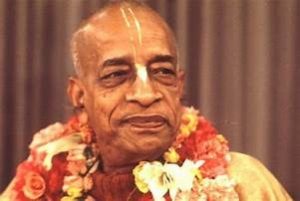Adi 3. 58--“By performing the sacrifice of congregational chanting of the holy name, learned scholars in the Age of Kali worship Lord Kṛṣṇa, who is now non-blackish because of the great upsurge of the feelings of Śrīmatī Rādhārāṇī. He is the only worshipable Deity for the paramahaṁsas, who have attained the highest stage of the fourth order [sannyāsa]. May that Supreme Personality of Godhead, Lord Caitanya, show us His great causeless mercy.”
Adi 3.79—One who says that ten million aśvamedha sacrifices are equal to the chanting of the holy name of Lord Kṛṣṇa is undoubtedly an atheist. He is sure to be punished by Yamarāja.
PURPORT–In the list of the ten kinds of offenses in chanting the holy name of the Supreme Personality of Godhead, Hare Kṛṣṇa, the eighth offense is dharma-vrata-tyāga-hutādi-sarva-śubha-kriyā-sāmyam api pramādaḥ. One should never consider the chanting of the holy name of Godhead equal to pious activities like giving charity to brāhmaṇas or saintly persons, opening charitable educational institutions, distributing free food and so on. The results of pious activities do not equal the results of chanting the holy name of Kṛṣṇa.The Vedic scriptures say: go-koṭi-dānaṁ grahaṇe khagasya prayāga-gaṅgodaka-kalpa-vāsaḥ yajñāyutaṁ meru-suvarṇa-dānaṁ govinda-kīrter na samaṁ śatāṁśaiḥ“Even if one distributes ten million cows in charity during an eclipse of the sun, lives at the confluence of the Ganges and Yamunā for millions of years, or gives a mountain of gold in sacrifice to the brāhmaṇas, he does not earn one hundredth part of the merit derived from chanting Hare Kṛṣṇa.” In other words, one who accepts the chanting of Hare Kṛṣṇa to be some kind of pious activity is completely misled. Of course, it is pious; but the real fact is that Kṛṣṇa and His name, being transcendental, are far above all mundane pious activity. Pious activity is on the material platform, but chanting of the holy name of Kṛṣṇa is completely on the spiritual plane. Therefore, although pāsaṇḍīs do not understand this, pious activity can never compare to the chanting of the holy name.
Adi 3.81-“I take shelter of Lord Śrī Kṛṣṇa Caitanya Mahāprabhu, who is outwardly of a fair complexion but is inwardly Kṛṣṇa Himself. In this Age of Kali He displays His expansions [His aṅgas and upāṅgas] by performing congregational chanting of the holy name of the Lord.”
PURPORT–Śrīla Jīva Gosvāmī has placed the verse from Śrīmad-Bhāgavatam quoted in text 52 (kṛṣṇa-varṇaṁ tviṣākṛṣṇam) as the auspicious introduction to his Bhāgavata-sandarbha, or Ṣaṭ-sandarbha. He has composed this text (81), which is, in effect, an explanation of the Bhāgavatam verse, as the second verse of the same work. The verse from Śrīmad-Bhāgavatam was enunciated by Karabhājana, one of the nine great sages, and it is elaborately explained by the Sarva-saṁvādinī, Jīva Gosvāmī’s commentary on his own Ṣaṭ-sandarbha.
Adi 3.84-Śrīmad-Bhāgavatam, the Mahābhārata, the Purāṇas and other works of Vedic literature all give evidence to prove that Lord Śrī Kṛṣṇa Caitanya Mahāprabhu is the incarnation of Kṛṣṇa.
Adi 3.89--“O my Lord, everything within material nature is limited by time, space and thought. Your characteristics, however, being unequaled and unsurpassed, are always transcendental to such limitations. You sometimes cover such characteristics by Your own energy, but nevertheless Your unalloyed devotees are always able to see You under all circumstances.”
PURPORT–This verse is also quoted from the Stotra-ratna (13) of Yāmunācārya. Everything covered by the influence of māyā is within the limited boundaries of space, time and thought. Even the greatest manifestation we can conceive, the sky, also has limitations. From the authentic scriptures, however, it is evident that beyond the sky is a covering of seven layers, each ten times thicker than the one preceding it. The covering layers are vast, but with or without coverings, space is limited. Our power to think about space and time is also limited. Time is eternal; we may imagine billions and trillions of years, but that will still be an inadequate estimate of the extent of time. Our imperfect senses, therefore, cannot think of the greatness of the Supreme Personality of Godhead, nor can we bring Him within the limitations of time or our thinking power. His position is accordingly described by the word ullaṅghita.He is transcendental to space, time and thought;although He appears within them, He exists transcendentally. Even when the Lord’s transcendental existence is disguised by space, time and thought, however, pure devotees of the Supreme Lord can see Him in His personal features beyond space, time and thought. In other words, even though the Lord is not visible to the eyes of ordinary men, those who are beyond the covering layers because of their transcendental devotional service can still see Him
Reply


